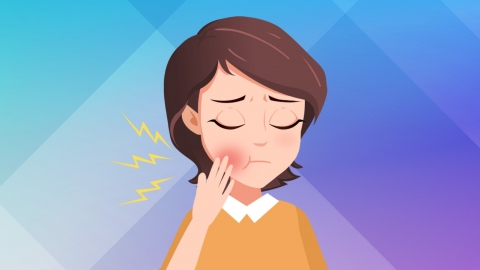How to treat neuropathic tooth pain
Generally, the treatment methods for neuralgic toothache mainly include oral care, physical relief, medication, traditional Chinese medicine (TCM), and root canal therapy. Specific analyses are as follows:
1. Oral Care
Maintaining good oral hygiene is essential. Brush teeth twice daily (morning and night) with a soft-bristled toothbrush using proper techniques. Rinse the mouth with warm salt water after meals to reduce tooth irritation caused by food debris accumulation. Avoid consuming excessively cold, hot, sweet, or hard foods to prevent stimulation of dental nerves and worsening of pain. Additionally, quit smoking and limit alcohol consumption to minimize adverse effects on gums and dental nerves.
2. Physical Relief
Gentle methods can be used to reduce nerve sensitivity. Common approaches include local cold compresses and warm water rinses. During episodes of pain, apply an ice pack wrapped in a towel to the cheek over the painful area for 15–20 minutes per session; this helps constrict blood vessels and relieve pain. Gargling with warm water at 35–40°C can soothe irritated dental nerves and alleviate discomfort.

3. Medication
Medications should be used under medical supervision. Commonly prescribed drugs include ibuprofen sustained-release capsules, metronidazole tablets, and mecobalamin tablets. Ibuprofen sustained-release capsules help suppress inflammatory responses and relieve pain. Metronidazole tablets prevent or treat bacterial infections in the mouth. Mecobalamin tablets provide nutritional support to damaged dental nerves and promote nerve repair.
4. Traditional Chinese Medicine (TCM)
According to TCM, neuralgic toothaches are often related to excessive stomach fire or kidney yin deficiency. Treatment focuses on clearing heat, purging fire, nourishing yin, and tonifying the kidneys. Commonly used herbal medicines include Niuhuang Jiedu Pian (Bezoar Detoxification Pills) and Zhibai Dihuang Wan (Anemarrhena, Phellodendron, and Rehmannia Pills). Acupuncture at specific points such as Hegu (LI4) and Jiache (ST6) may help unblock meridians, regulate qi and blood flow, and reduce symptoms of dental nerve pain.
5. Root Canal Therapy
For severe damage to the dental nerve with recurrent pain, root canal treatment may be necessary. This procedure involves removing necrotic pulp tissue inside the tooth, disinfecting the root canal, and sealing it to block external stimuli, thereby addressing the root cause of neuralgic tooth pain. After treatment, a dental crown should be placed promptly to protect the treated tooth.
In addition, patients should follow medical instructions carefully during treatment and schedule regular dental check-ups to monitor recovery progress. If symptoms such as increased pain, gum swelling, or facial swelling occur, prompt medical attention is required to adjust the treatment plan and prevent worsening of the condition and further impact on oral health.




